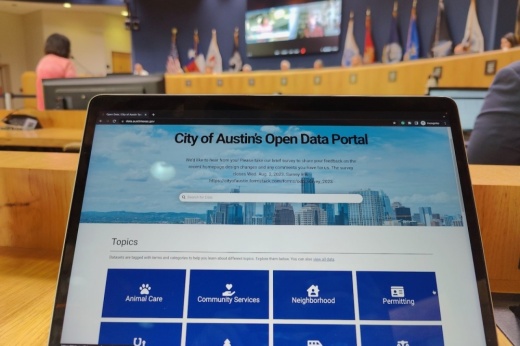The setup
Austin's open data portal is home to a variety of public statistics, charts, maps and other reporting on topics, such as city spending, local development, traffic accidents, maintenance requests and community health outcomes.
The public data can be a key resource both for city staff and residents seeking out information about their government, although auditors found Austin's current data reporting is scattershot across city departments with room for improvement.
“Having reliable data is important because it allows the city to measure the effectiveness of its operations, and then on the community member side it provides a window into city operations and helps provide accountability," audit lead Francis Reilly said during a July 25 City Council briefing. "Right now, that window’s a little bit hard to see through.”
The specifics
The recent audit was based around two central questions: whether Austin had addressed data shortcomings called out in previous reviews, and if the city's data portal provides "reliable, accessible and useful" information.
In answering those questions, auditors found many lingering problems with city data and the online portal. For example, auditors found unresolved data issues linked to four of seven audits with previously identified problems.
Additionally, more than half of the departments analyzed in a portion of the audit keep internal records that don't match up with information that's displayed for the public. The discrepancies varied from a handful of records to "hundreds of thousands" of differences—auditors pointed to larger inconsistencies in 311 and traffic incident data in particular—that may skew how anyone from private residents to city officials views the information.
“That’s really the takeaway, is not that any particular department’s data is wrong, but that we have widespread data reliability issues across the city," Reilly said.
The report also stated that Austin has no firm strategy in place to consistently compile and present information to the public, thanks in part to the absence of any central management of the system as a whole.
“Individual departments make data publicly available through the Open Data Portal, but often without a clear purpose or audience for the data. Data is often not presented in a way to make it accessible to a wide audience," the audit states.

While the city does have a technology management office that maintains the open data portal, its staff aren't responsible for the data itself. And unlike Austin, auditors noted that many other cities do have a data chief position to manage the gap between departments' reporting and the central data system.
Overall, Reilly said Austin doesn't:
- Have executive oversight of its public data
- Maintain a full inventory of its data assets
- Set standards for the data presented on its portal
- Track insights related to user activity on the data portal
- Offer accessible training or support for data portal users
“This really isn’t a good way of sharing information," he said.

Auditors did find that, while flawed, Austin's open data portal is by far the most robust among the cities that they reviewed, including New York. They also credited Austin for being on the path toward implementing many best practices with regard to data handling, even if certain goals haven't been achieved.
What's next
The audit proposed two high-level recommendations to improve Austin's data systems, both of which were accepted by city leadership. Interim Chief Information Officer Kerrica Laake told council the changes were wrapped into a data improvement "roadmap" and are now in the works.
The first recommendation said interim City Manager Jesús Garza should set clear goals for data practices while better tracking how data is accessed, providing more context alongside raw numbers and removing outdated information from the public portal.
In response, city management said they plan to have all departments tap an individual liaison to handle data-sharing and regularly refresh the public portal with current information while cleaning out older assets.
The second proposal called to centralize oversight of public data, inventory what's in the data portal and roll out new processes to ensure content is accurate.
City management said the central technology office will be publishing such an inventory, and that departments will be noting any differences between their information and data published online with semiannual reviews to maintain data quality.
Those changes are all projected to be completed by next July. Assistant City Manager Rodney Gonzales also told council a more "robust" response to the audit recommendations will be shared with them in the future.
Council Member Alison Alter said the changes are important to address both for the city's broader planning efforts and transparency in the community.
“We’ve taken really important steps to make our data available, and now there’s more that we need to do to make sure that this data is clean and is useful for people," she said. "We need to train people, we need to understand with the availability of the data what people are using and how they’re using it. And when we have multiple datasets that speak to the same thing, if there’s one that’s going to be more helpful for the public. ... We also need to understand what’s being used internally and externally so that we know who we’re trying to serve with this program."





